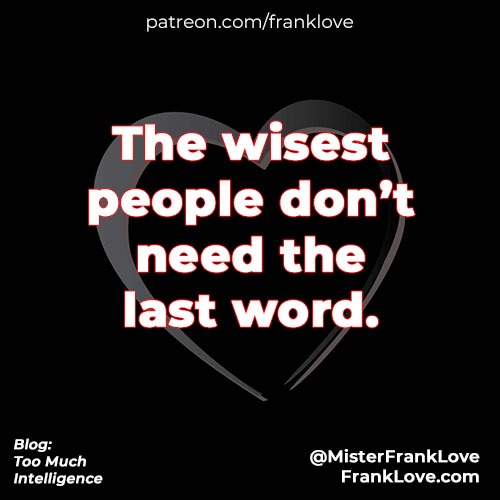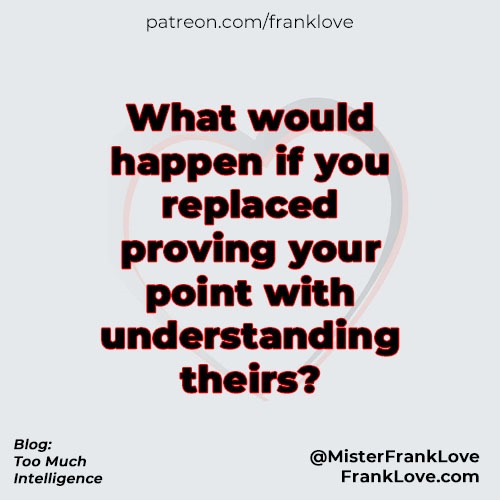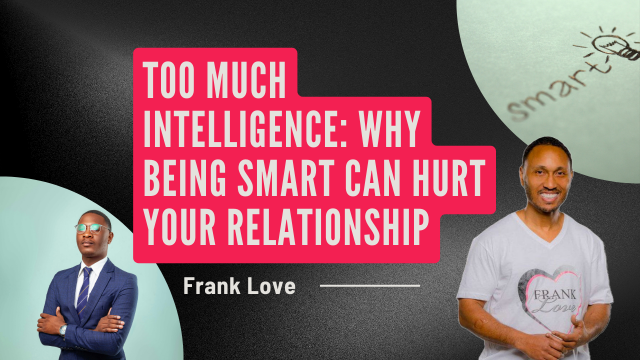
Too Much Intelligence: Why Being Smart Can Hurt Your Relationship
Bringing more wisdom to relationships helps build connection rather than conflict.
In my previous blog post, “When Needing Attention Leads to a Fight,” we discussed how a shift to a “complimentary” attitude can deter disagreements and lead to a stronger connection.
If I told you that you were very intelligent, you’d probably take it as a compliment. Most would. After all, intelligence is often praised as a key to success—in school, in business, and in life in general.
But in relationships, intelligence isn’t always the gift we think it is. In fact, one of the biggest contributors to the constant bickering in many relationships is the intelligence level of the people in them.
When we see a couple arguing regularly and relentlessly, there’s a good chance it’s because they’re both very smart. Maybe too smart for this—or any—relationship.
When Intelligence Becomes a Roadblock
I’m not saying this hypothetical relationship is doomed. Being intelligent doesn’t mean the connection is trash. But when two very intelligent people are paired together, the communication often gets stuck in a battle of wits rather than a sharing of hearts.
To move past this, we might actually need less intelligence and more wisdom.
Wisdom, not intelligence, is often the secret ingredient to smoother communication and healthier relationships.
Why Wisdom Wins over Intelligence in Relationships
Too much intelligence can lead to a constant need to prove something.
We feel we must:
- prove our point.
- ensure the other person fully hears and understands us.
- say everything that needs to be said, down to the last detail.
- keep talking until we feel our position is validated.
These efforts may sound reasonable. However, this approach centers on us. It’s all about making sure we get heard, we make our case, we get our points across.
Wisdom flips that script.
Wisdom may say:
- Let me understand where my partner is coming from.
- Let me figure out what they can and cannot hear.
- Let me become aware of what their challenges are, and where their blind spots might be.
Instead of pressing harder to get our own way, wisdom invites us to lean in, listen, and adapt to the other person’s capacity for receiving what we have to share.
The Problem with “Winning”
When intelligence runs the show, every disagreement can feel like a debate that has a winner and loser. That’s dangerous territory for a relationship.
If our goal is to “win” a conversation, we’ve already lost the deeper battle: creating trust and connection.
Relationships thrive when both people feel understood, not when one person emerges victorious in the war of words.
It’s worth asking ourselves:
- Am I listening to respond, or listening to understand?
- Do I care more about my point being right, or about my partner feeling heard?
- Is my need to be correct getting in the way of my need to be connected?
What Wisdom Looks Like in Action
Wisdom in a relationship might look like:
- Letting go of the last word.
- Asking clarifying questions instead of making declarations.
- Recognizing when our partner is at their emotional limit and when we might be best served by pressing pause.
- Adapting our communication style to fit the moment rather than sticking to our usual approach.
It doesn’t mean we hide our intelligence or pretend not to know things. It means we use our knowledge in service of connection, not competition.
A Personal Request
Here’s my request, both to you and to myself: Let’s argue less by leaning into wisdom more than into intelligence.
Intelligence has its place. But in the heat of a disagreement, it can be like adding fuel to the fire. Wisdom, on the other hand, can be the water that cools the flames.
Please remind me of this too, because I’m not immune to the pull of proving myself. I can get caught up in the need to be understood. But when I step back and lead with wisdom, the whole tone of the interaction changes.
This Week’s Challenge

If we find ourselves in a disagreement, let’s:
- Pause before responding.
- Ask ourselves: Do I want to be right, or do I want to be connected?
- Listen for what our partner is truly saying—not just the words, but the feelings underneath.
- Respond in a way that acknowledges their perspective, even if we don’t agree with it.
We may be surprised at how quickly the tension eases when the goal shifts from proving to understanding.
The Bottom Line
Too much intelligence without enough wisdom can make relationships harder than they need to be.
Wisdom helps us step away from the ego-driven need to win and into the heart-driven desire to connect.
Here’s to arguing less, understanding more, and building relationships where both of us feel seen, heard, and valued. Not because we’re proving how smart we are, but because we’re practicing the deeper art of wisdom. And that’s loving.
Keep Rising,
Frank Love
In my next blog, “I Work Too Hard,” I will talk about realigning our decision-making around intentional priorities rather than short-term fixes.
Watch my video Too Much Intelligence Related to this blog.
Watch Frank Love’s presentation “The Act of Caring.”
Subscribe to receive Frank’s weekly blog.
Become a sponsor of Frank Love and his work creating a loving cultures in our relationships with a monthly contribution of as little as $2. Sign up today at Patreon,com/FrankLove.
– – – – – – – – – – – – – – – – – – – – – – – – – – – – – – – – – –
Each week, Frank Love hosts Zoom support group meetings that assist women and men as we work to create a loving culture in our relationships. Calls occur from 7:00 p.m. to 8:30 p.m. EST and can be accessed by visiting FrankWeeklyCall.com.
- Tuesdays – Black Women: Creating a Loving Culture in Our Relationships
- Thursdays – Black Men: Creating a Loving Culture in Our Relationships
– – – – – – – – – – – – – – – – – – – – – – – – – – – – – – – – – –
Frank Love coaches individuals who are in (or wish to be in) a relationship toward creating a loving culture in their family. He is also the author of Relationship Conversations You Don’t Want to Have (But Should Anyway) and 25 Ways to Be Loving. To schedule a free consultation, contact Frank at Frank@FrankLove.com.


